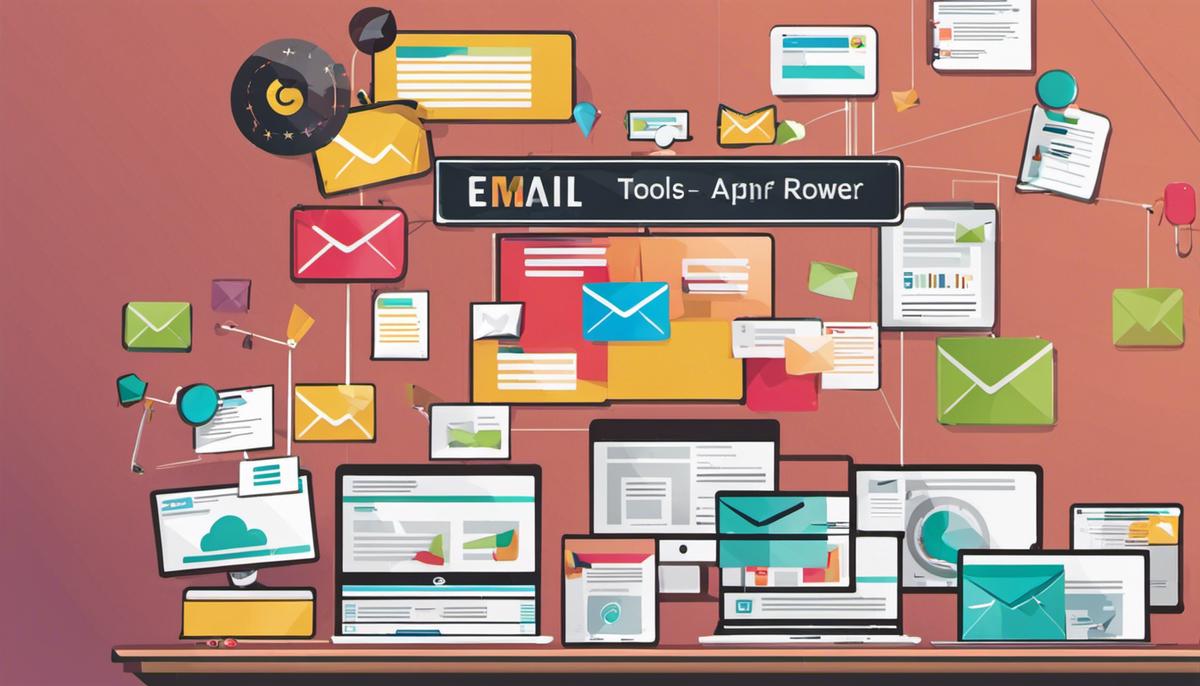
Explore the Top Alternatives to MailChimp for Email Marketing
Choosing an efficient email marketing solution tailored to your business needs can be an daunting task with a plethora of options available on the market. From understanding what exactly email marketing is and its significance, to analyzing one of the most popular providers, Mailchimp, our expedition explores the nitty-gritty details many may overlook. This also includes delving into top alternatives to Mailchimp like SendinBlue, ConvertKit, and GetResponse. In this process, we keep in mind the unique requirements of every company such as its size and budget constraints. The aim here is to allow you to make an informed, practical decision backed with solid data and comprehensive analysis.
Contents
Understanding Email Marketing Needs
Understanding Email Marketing Needs
Email marketing is a effective strategy in the digital marketing landscape that focuses on sending emails to prospects and customers. Its primary purpose is to engage with potential customers, develop relationships with existing ones, and promoting content or special offers. It is an important tool as it allows brands to reach consumers directly at a relatively low cost and high speed.
Marketers make use of email marketing to achieve various business goals including brand awareness, customer retention, generating new leads, encouraging customer loyalty, promoting new products or services, and driving more sales. A well-implemented email marketing strategy can provide a good return-on-investment (ROI) by converting prospects into customers and one-time buyers into loyal followers.
When choosing an email marketing service, there are certain needs or requirements to consider. These include ease of use, automation features, design flexibility, reliability (deliverability rate), customer service, scalability, integration capabilities, price, and analytics reporting. It is also important to see if the provider complies with international email laws like CAN-SPAM, CASL, and GDPR.
Understanding the Features Necessary in a Mailchimp Alternative
Mailchimp has long been a market leader in email marketing, but businesses may occasionally seek alternatives for a multitude of reasons including cost, a lack of specific features, or dissatisfaction with customer support. In such situations, knowing the features that prospective alternatives should possess becomes key.
Automation is a central part of email marketing, enabling the timely dispatch of targeted emails without user intervention for each email. Alternatives to Mailchimp should be able to maintain high deliverability rates, making sure your messages land in subscribers’ inboxes instead of their spam folders.
Design flexibility is another essential feature, allowing businesses to tailor and craft emails that reflect their own brand. A user-friendly system which allows creation of eye-catching emails, preferably via a drag-and-drop editor, and supports myriad email formats (like newsletters, promotional campaigns, and transactional emails) would be ideal.
Lastly, comprehensive analytics and reporting tools, easy list management features and robust customer support are other important features in a Mailchimp alternative. Options like SendinBlue, Zoho Campaigns, and Constant Contact come to mind while discussing popular alternatives.
Factors such as the level of email marketing needs, audience size, budget, and anticipated customer support quality need to be taken into account while choosing an alternative to Mailchimp or any other email marketing service. It is crucial to explore different platforms, testing their features before settling on the option most aligned with your business’ unique requirements.

In-Depth Review of MailChimp
A Closer Look at MailChimp’s Features
MailChimp is an all-in-one marketing platform that offers an array of features aimed at simplifying automated marketing efforts, including email marketing, website creation, and customer relationship management (CRM).
At its core, MailChimp excels at helping users devise, launch, and review email campaigns, offering a slew of handy tools such as templates, customizable sign-up forms, and an A/B testing feature, all available on an interface that caters to both beginners and experts.
With automation capabilities, MailChimp enables your business to create and dispatch targeted campaigns based on factors such as customer behavior, preferences, or purchase history.
MailChimp’s cutting-edge CRM features allow users to segment contacts based on data like demographics, engagement levels, and behaviors, facilitating more targeted marketing. This further aids in developing detailed customer profiles.
Further, this platform comes equipped with comprehensive analytics tools that let you track important metrics such as clicks, open rates, bounces, and delivery rates for your campaigns.
MailChimp Pricing
MailChimp offers four pricing tiers. The Free plan covers fundamental marketing needs for small businesses or beginners. It includes basic templates, a CRM, and 1-click automation.
The Essentials package, priced at $9.99/month, unlocks all email templates and multi-step automations. A/B testing is accessible here.
The Standard plan, at $14.99/month, incorporates features like behavioral targeting, custom templates, and advanced analytics.
Lastly, the Premium plan costing $299/month provides advanced segmentation, multivariate testing, comparative reporting, and phone support.
MailChimp Pros
MailChimp shines in its user-friendly interface and its scale of operations catering to different business sizes. The platform’s email marketing tools remain robust and easily customizable, accommodating extensive personalization.
Targeting and segmentation features, integrating with the CRM, enhance customer engagement and campaign performance. The platform’s reporting tools provide ample insights into campaign performances to aid in refining strategies.
Finally, the free tier can be a cost-effective solution for small businesses or beginners exploring email marketing landscape.
MailChimp Cons
However, MailChimp faces criticism over its steep pricing for higher-tier options. Competitors often offer similar services at lower prices. The CRM, while useful, lacks depth compared to standalone CRM software.
Some users have reported complexities in navigating the platform and issues with customer service responsiveness. The platform’s automated services were considered inflexible by a section of users.
Finally, MailChimp’s strict approach towards compliance has resulted in some legitimate businesses being shut down, stirring discontent among such users.
Exploring MailChimp Alternatives
Businesses looking for alternatives to MailChimp have several options that offer comparable or superior features. For instance, Constant Contact impresses with its all-inclusive email marketing tools, ecommerce solutions, and event management capabilities. Another service, SendinBlue, shines in the areas of transactional emails and SMS marketing. Drip, on the other hand, is particularly suitable for ecommerce, offering website tracking, detailed workflows, and integrations with numerous ecommerce platforms. For bloggers and authors, ConvertKit provides dynamic content creation, automation blueprints, and audience segmentation. Each of these MailChimp alternatives boasts unique strengths, pricing models, and target audiences. Therefore, careful research is needed to find the platform that best meets your specific requirements.

Top Alternatives to MailChimp and Their Features
SendinBlue: A Feature-Rich Alternative to MailChimp
Renowned for its powerful marketing automation capabilities, SendinBlue (Now called Brevo) is a versatile tool that supports customer engagement across various platforms. Its comprehensive feature set ventures beyond typical email marketing to accommodate SMS messages, chat, CRM, and Facebook advertisements. Thanks to a user-friendly drag-and-drop builder and customizable templates, crafting distinctive email campaigns with SendinBlue is an effortless process.
SendinBlue separates itself from other services with its unique pricing system, which varies depending on the number of emails sent each month, instead of the number of contacts. Their free plan allows users to send up to 300 emails daily, while their paid plans, which span from $25 to $66 a month, include access to additional features like A/B testing, advanced statistics, and unlimited marketing automation.
SendinBlue’s advanced automation features set it apart from its competitors, allowing users to develop custom workflows based on individual customer behavior. However, it should be noted that their landing page builder isn’t as intuitive as those found on other platforms and might require some coding knowledge to use effectively.
ConvertKit: Ideal Platform for Creators
ConvertKit addresses the needs of creators including bloggers, artists, and musicians. It offers visual automation builder, customizable forms, and landing pages for audience growth. Its unique selling proposition lies in its simple, easy-to-use interface and high deliverability rates, ensuring that your emails reach the recipient’s inbox.
ConvertKit’s free plan offers unlimited landing pages and up to 1,000 subscribers. Paid plans start from $29/month for up to 1,000 subscribers and go up to $79/month for up to 3,000 subscribers, adding more features like automation and premium support.
Though it has easy-to-use features, ConvertKit does not offer email templates. This implies you’ll need to craft your emails from scratch, which could be a disadvantage if you’re looking for quick and easy email creation.
Exploring Marketing Solutions: GetResponse
Consider GetResponse as more than just an email marketing application. This all-in-one platform offers a vast range of solutions for your marketing needs, from webinars to landing pages and even automation for your marketing. Its integrated CRM tool makes organizing customer relationships tasks simple and straightforward. GetResponse provides standard email marketing features such as a drag-and-drop builder, A/B testing, and email analytics.
For the basic features with an email list size of 1,000, pricing starts at $15 per month. For more extensive features, such as automation builder and webinar funnels, the Plus plan is available at $49 per month. Please note that these prices will increase depending on your list size.
Though GetResponse offers multi-channel marketing abilities, it is important to note that the platform might seem complicated and feature-heavy for beginners. Moreover, the landing page editor, unlike the email editor, might have some user-unfriendliness issues.

Choosing the Right Alternative
Looking for Mailchimp Alternatives? Consider Sendinblue
If you are looking for affordable alternatives to Mailchimp offering diverse capabilities, Sendinblue is worth considering. This robust platform provides a variety of functions, ranging from email marketing to landing page creation. In addition, for businesses that prioritize customer relationship management (CRM), Sendinblue integrates CRM functionality directly onto their platform. Unique to Sendinblue is its pricing model, based on the number of emails sent rather than the size of your email list making it a cost-saving option for smaller businesses.
Mailchimp Alternative: Constant Contact
An extremely user-friendly platform, Constant Contact is known for its intuitive layout and wide array of customizable email templates. Its email marketing capabilities are excellent, offering comprehensive reporting, social media integration, list segmentation, and a wealth of educational resources for users. It, however, does not provide CRM functionality or advanced automation like some other alternatives.
Mailchimp Alternative: GetResponse
If you’re looking for a feature-rich marketing automation, GetResponse is a worthy Mailchimp replacement. It offers a suite of tools like a landing page builder, integrated eCommerce platform, and advanced segmentation. Its autoresponder functions are robust, allowing users to design and automate entire marketing funnels.
Mailchimp Alternative: ActiveCampaign
ActiveCampaign offers some of the most comprehensive automation features available in the market. This incorporates CRM and sales automation, making it a one-stop solution for businesses needing detailed tracking of client interactions. This platform is configurable to your business’s specific needs, though it might have a steep learning curve for those unfamiliar with extensive automation tools.
Mailchimp Alternative: ConvertKit
Especially popular among bloggers and creatives, ConvertKit offers a straightforward approach to email marketing focusing on simplicity and effective audience segmentation. It doesn’t have diverse templates that some other platforms do, but the ones it has are clean and professional-looking. It also specializes in marketing automations specifically designed to serve the needs of individual content creators.
Mailchimp Alternative: Drip
Primarily targeting eCommerce businesses, Drip offers sophisticated email marketing automation designed to maximize customer engagement and drive sales. It boasts a visual workflow creator for complex customer journeys, integrations with leading eCommerce platforms, and in-depth analytics.
The best Mailchimp alternative depends on your business size, budget, and unique requirements. Consider how each platform can solve your specific needs and offers value for money. A platform offering advanced features is not necessarily the best if you are not going to use them. Try to look for the sweet spot between the functionality required and the price point for that functionality.

Ultimately, the choice of a Mailchimp alternative boils down to your unique business needs, objectives and budget considerations. Through an in-depth understanding of email marketing and a comparative analysis of top market players, this guide empowers readers to make that choice with confidence. Whether it’s SendinBlue for its impressive free tier offering, ConvertKit for its robust automation features, or GetResponse for an all-rounder marketing tool, rest assured that you will be making a well-informed decision. The key is to understand your requirements and match them with the features, benefits, and pricing that best suit your business. Remember, the best solution is always relative to your individual circumstances and needs.

